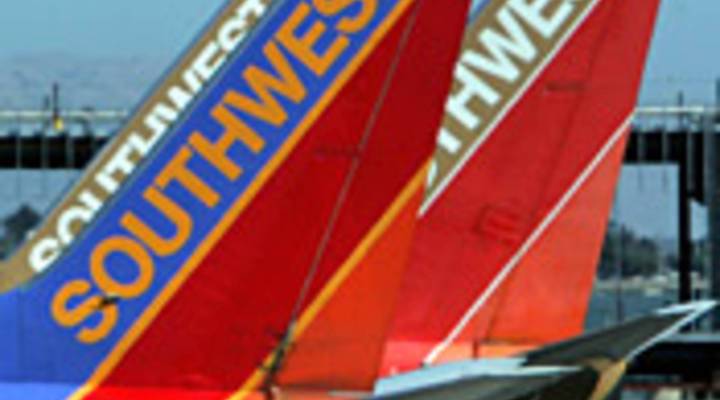
Unusual question at Southwest: Window or aisle?
Share Now on:
Unusual question at Southwest: Window or aisle?

KAI RYSSDAL: Southwest Airlines passengers flying out of San Diego today are in for something a little bit different. Along with its peanuts and flight attendants wearing sneakers, Southwest is famous for its boarding process. Essentially, first come first served. Can be kind of a free-for-all. But the carrier’s experimenting with the aviation mainstream. Assigning seats. Marketplace’s Ethan Lindsey tried to figure out why the no-frills flyer is testing this . . . frill.
ETHAN LINDSEY: Ahh, the cattle call. The phrase alone conjures up romantic images of the old West. Grand, sweeping landscapes. Cowboys herding cattle over Montana’s prairies. Unfortunately, in today’s world, we’re the cattle being called.
[SOUND: “. . . now boarding people with row A. . . “]
Sounds a bit like the New York subway. But if you’ve ever flown Southwest Airlines, you know what’s going on. Instead of assigning someone a specific seat for a flight, say 5-C, Southwest herds people onto the plane in three groups of 45 passengers.
JOHN WHITE: I really like the way Southwest works because it allows you, if you show up early enough, you are the first one on and the first one off. The way seats are assigned it doesn’t matter if you have more money or more miles. It’s just, if you get to check in and you are there first.
That’s John White. When I talked to him, he was camped out first in line more than two full hours before his flight to Oakland.
For early birds like White, open seating just means first dibs on that window seat in the front row. But for Southwest, their passengers’ self interest actually helps the bottom line. Think of it a bit like Adam Smith’s invisible hand — in an airport.
The quicker you get on board, the better your seat. So people end up boarding the plane as fast as they can. Presto! The faster the plane boards, the more likely it is to leave on-time. And on-time departures mean real money in the cut-throat airline industry.
Beth Harbin is a spokeswoman for Southwest, which has been around for 35 years.
BETH HARBIN: 1971, we really didn’t have enough folks on board to even consider a boarding process. We have found, though, that in having an open seating call, the boarding is much quicker than in any of our competitors. That’s a very important piece of what makes Southwest successful.
So why mess with that success? Well, as Southwest has grown, it’s become more dependent on business travelers. And business travelers are the ones who are asking to ditch the cattle call. Their expense accounts can afford to pay a premium for better seats.
So, Southwest feels pressured to adapt even though its not entirely sold on the idea.
HARBIN: We’ve actually heard from a lot of business travelers who say, “Hey, don’t make a change.” And we’ve also found, ironically, that the other carriers in our industry are changing their boarding processes to look a little bit more like Southwest’s.
Take Northwest Airlines. Its passengers still get assigned a specific seat, like 5-C. But a month ago, Northwest changed its boarding procedure. Instead of letting people on in rows 1 through 5, then 5 through 10, and so on, the gate agent now says Go and opens the gates.
Northwest says the rush to board can save an average of five to 10 minutes per flight. It’s that invisible hand again. Which is why Southwest aficionados are so mystified that their carrier seems to now be flying against the jet stream.
Erick Mechler flies Southwest more than twice a week.
ERICK MECHLER: You never really know what kind of seat you want before you get on the plane. You may want a window seat. You may want an aisle seat. You may want to sit next to, or as far away from, somebody as possible. And the cattle call lets you do that.
Southwest would tell Mechler: Don’t worry. This test is just that. It’s limited to a few flights out of San Diego and no decision will be made for a least a few years.
Plus if the airline eventually does decide to assign seats, it promises to keep some of the flavor that won it so many loyal customers in the first place.
In San Diego, I’m Ethan Lindsey for Marketplace.
There’s a lot happening in the world. Through it all, Marketplace is here for you.
You rely on Marketplace to break down the world’s events and tell you how it affects you in a fact-based, approachable way. We rely on your financial support to keep making that possible.
Your donation today powers the independent journalism that you rely on. For just $5/month, you can help sustain Marketplace so we can keep reporting on the things that matter to you.












